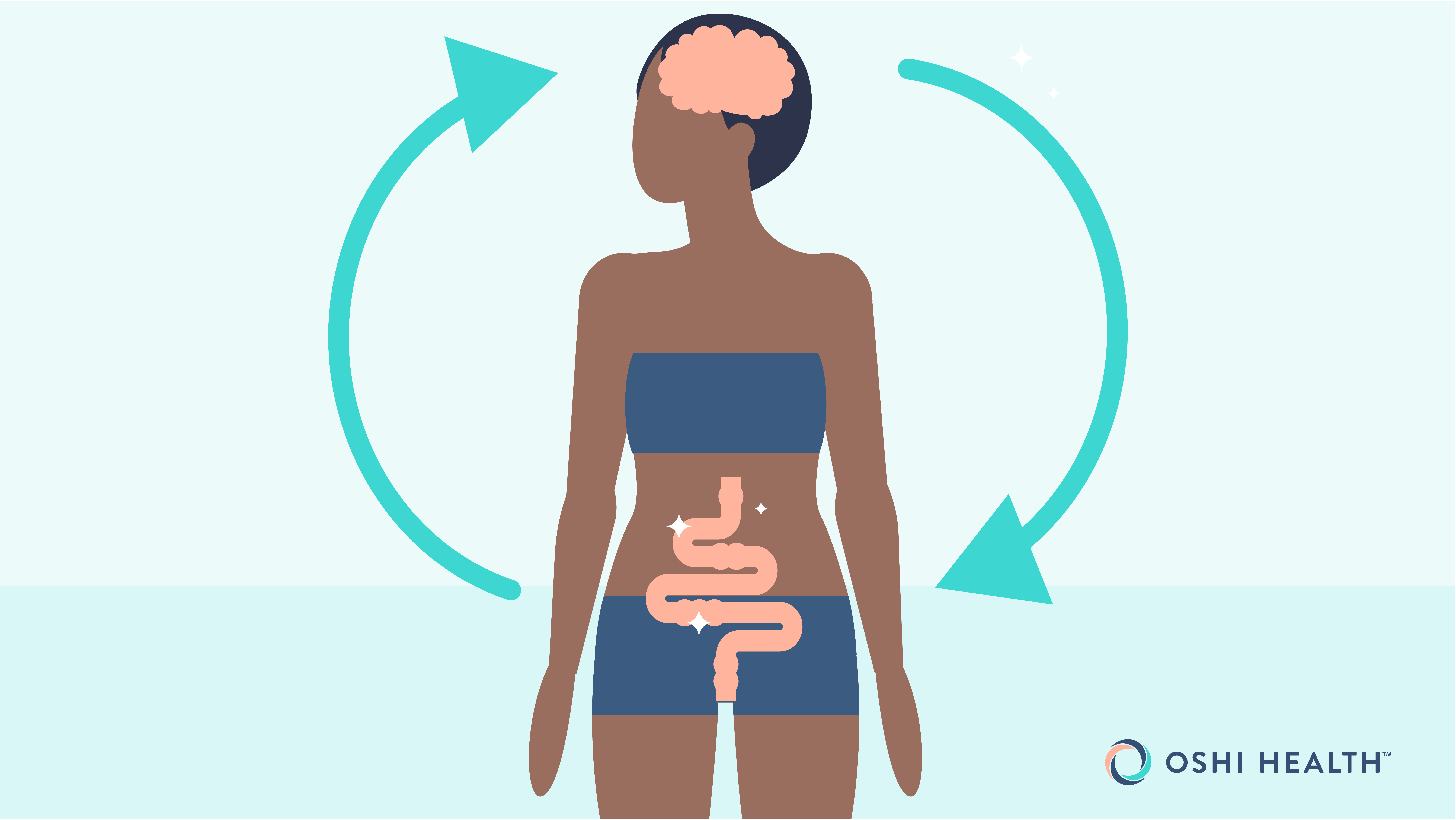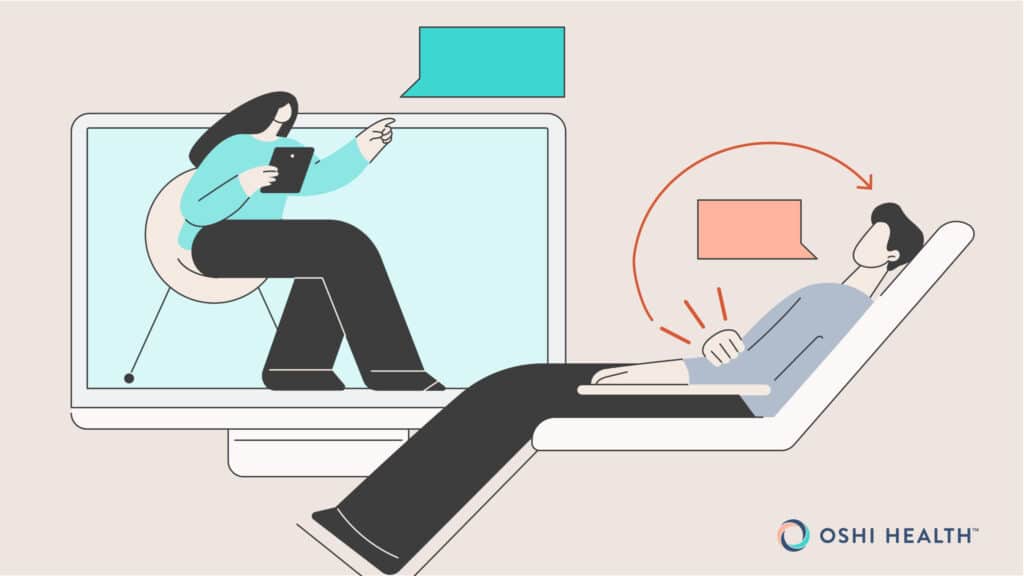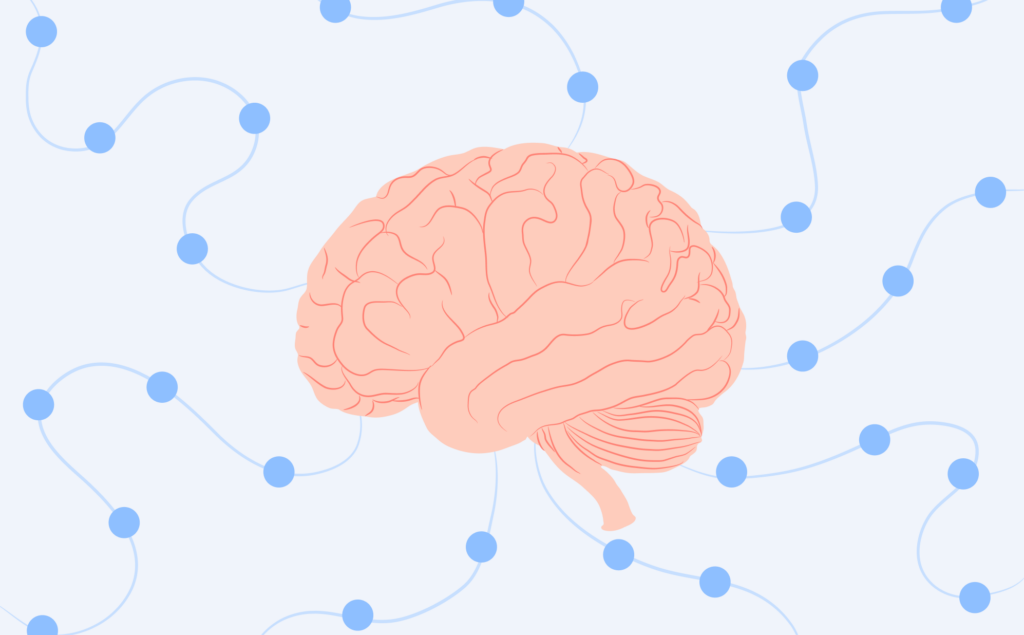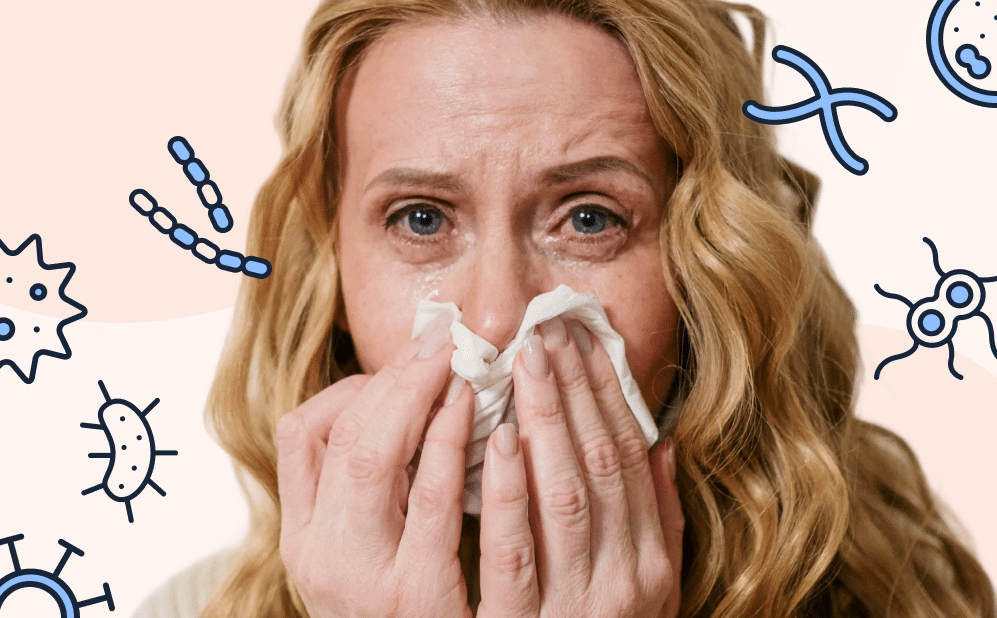While gut feelings and knots in the stomach point to a gut-brain connection, they also make it sound more abstract than it is. By demystifying this connection, you can better understand how GI and mental health symptoms are interconnected and why simple strategies to regulate both gut and mental health are so powerful.
Understanding the gut-brain axis
The gut-brain connection sounds imaginary, but it’s a real part of anatomy that we refer to as the gut-brain axis. “The gut-brain axis is the communication pathway between the brain and the gut,” says Steve Feinstein, PhD, a GI psychologist and gut-brain specialist at Oshi Health. He adds that this connection is a two way street, meaning the brain can send messages to the nervous system in the gut and vice versa.
That two way street is also known as our nervous system. Our nervous system sends important cues to and from the enteric nervous system in the gut and the central nervous system in the brain. The brain then uses those cues to regulate digestion, the metabolic system, the immune system, and the endocrine system (a complex group of organs that help maintain energy levels, influence mood, dictate the body’s growth and development, and help the body respond to injuries or stress).
While multiple nerves connect the brain and gut, Dr. Feinstein says that the vagus nerve is the most significant. This nerve runs from the gut to the brain and carries chemical messages between the two.
The vagus nerve is a highway where information about our respiratory system, digestion, and heart rate can travel. Dr. Feinstein elaborates, “The vagus nerve is a nerve that connects our brains’ autonomic nervous system center to the enteric nervous system in our gut. The vagus nerve sends information to the brain constantly about what’s going on so the brain can regulate function and just have an idea of how the individual is doing, because all these processes are important to sustain life.”
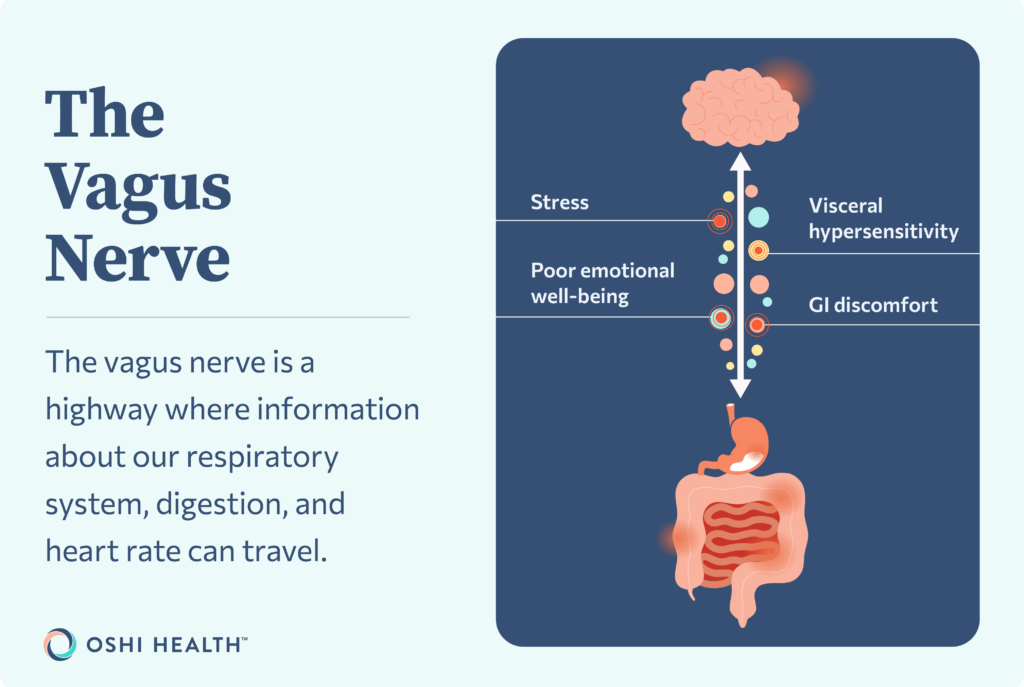
The impact of gut health on mental health
If someone you live with is having a bad day, it will probably affect your mood. The gut and brain work similarly; disruptions in one impact the other. “Our mental health is the way that our nervous system reacts to our world, and it creates a state of comfort or discomfort,” says Dr. Feinstein. When we get negative messages from the gut, a state of mental discomfort is created, which influences how we feel.
But it’s not just messages and status updates traveling between the gut and brain. Hormones get their passport stamped too. In fact, 90% of serotonin, a mood-boosting hormone, is created in the gut and then travels to the brain. Many GI conditions impact serotonin creation, which explains why 40-90% of people with IBS also have some degree of anxiety or depression.
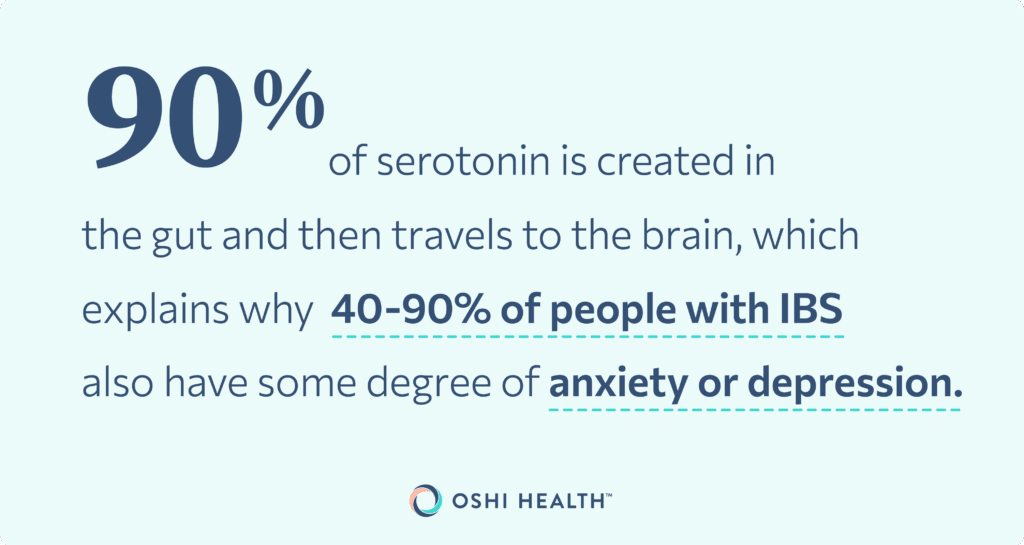
There’s also a third way gut health affects mental health, and this one isn’t anatomical: GI symptoms disrupt our daily life. Maybe they cause you to leave a dinner party early. Or they hinder your ability to to enjoy hobbies, like long distance running or travel, or feel confident in work meetings. These disruptions can stir up feelings of concern, embarrassment, or shame, leading to worsened mental health symptoms, says Dr. Feinstein.
Mental health conditions linked to poor gut health
By now, we’ve established that gut health impacts mental health, but what exactly does this connection look like? Mental health symptoms differ from person to person, but Dr. Feinstein mentions that symptoms associated with depression and anxiety are the most common when the gut isn’t operating business as usual. Poor gut health can also trigger chronic stress—and conversely, chronic stress can be a catalyst for GI symptoms.
In turn, these mental health symptoms can exacerbate GI symptoms. “It is a vicious cycle,” explains Dr. Feinstein, “GI symptoms lead to depression and anxiety, and as our depression and anxiety increases, more physiological changes disrupt our gut, so our GI symptoms increase.”
Poor gut health also impacts our brain beyond mental health. Cognitive health symptoms include:
- Memory problems
- Difficulty making decisions
- Trouble regulating mood
- Attention difficulties
- Brain fog
The gut-brain connection and GI treatment
As we’ve established, the gut-brain axis is a package deal. To improve gut health, you need to focus on mental health and vice versa. The best approach encompasses dietary changes, strategies to calm the nervous system, and treatment for thoughts and beliefs about GI symptoms.
For T.K., this multifaceted approach changed everything. “The provider was fantastic and spent a lot of time reviewing my medical history and giving a good synopsis of my current problems,” said T.K., “I had already seen two other GI providers and nobody had ever asked me about my diet or mentioned the brain-gut connection. It was very refreshing to have someone look at the whole body and not just my symptoms.”
Whole-person GI care
Let’s make one thing clear: the best way to treat GI conditions is with a whole-person approach. That means your treatment plan should encompass diet, thoughts and beliefs about your GI condition, your nervous system, and your lifestyle.
More and more, researchers are discovering that the various aspects of wellbeing are interconnected. This couldn’t be more true than with the gut and brain—and you deserve to work with a team of GI specialists who understand that.
Therapy
When you work with a team of GI specialists, a gut-brain specialist should be on the team roster. Gut-brain specialists will lead you through therapy sessions, though not in the traditional sense.
In traditional therapy, a mental health specialist works through stressors across all facets of our lives. GI therapy consists of practices geared toward how someone thinks about their GI symptoms and how to calm their nervous system (aka the pathway between the gut and brain).
“As gut-brain specialists, we’re taking a very similar theoretical approach to treatment, but we’re focusing very specifically on GI events,” Dr. Feinstein says, “A lot of times, we’re helping our members look specifically at their concerns, thoughts, and beliefs about their gut health.”
Simple strategies to improve gut health
While treatment is important, GI conditions occur outside GI care appointments. Your GI treatment should extend beyond these appointments as well. Often, the most effective strategies are those we can use for the 99.9% of life spent outside a doctor’s office. These five techniques might do the trick.
Diaphragmatic breathing
The diaphragm, a dome-shaped muscle in the abdominal cavity, is the reason we can breathe. When we inhale, the diaphragm draws the chest downward and when we exhale, it pushes the chest up. At the same time, it sucks in the stomach on an inhale and releases it as we exhale.
Along with helping us breathe, this in and out of the stomach facilitates digestion, says Dr. Feinstein. And to recap, when digestion improves, gut health overall improves, creating a chain reaction that positively impacts mental health.
To set off this chain reaction. Dr. Feinstein recommends trying diaphragmatic breathing. In one study, diaphragmatic breathing decreased GI symptoms for those with gastroesophageal reflux disease (GERD).
“This powerful technique calms the nervous system, which in turn, can very specifically decrease GI and mental discomforts in the moment,” explains Dr. Feinstein. He adds that this technique works with any GI condition and is highly accessible. It can be done lying down, standing up, or sitting and at home or on the go. If you have a minute or two before a zoom meeting, for example, you can take a few diaphragmatic breaths to calm your gut and brain.
The best way to learn diaphragmatic breathing is by working with a gut-brain specialist, but this video can give an idea of what this technique looks like.
Practical self talk
Pep talks aren’t just for job interviews or convincing yourself to go to the gym. They can also provide relief when GI or mental health symptoms flare-up. “Practical self-talk techniques allow you to quickly examine what you’re thinking about your gut and then be able to modify it so that it’s less worst case scenario and catastrophic,” says Dr. Feinstein, “It’s a simple tool with a significant influence on how our nervous system reacts when a GI event occurs.”
A 2022 study supports the idea that your gut reacts to thoughts and feelings about your gut health. The researchers discuss how those who think negatively about their GI conditions often report worse GI symptoms.
Guided meditation
Perhaps one of the oldest gut-brain interventions is guided meditation. This strategy is a favorite for a reason—meditation works. While meditations have long established mental and physical health benefits, a 2022 study emphasizes how they can calm the vagus nerve, improving the gut-brain connection.
There are even guided meditations designed specifically for GI function. Dr. Feinstein says these meditations “lean into certain statements and themes about managing stress, muscle tension, and the function of GI.” For individuals with GI conditions, these meditations are more effective than general meditations.
Hypnotherapy
Hypnotherapy, a practice related to guided meditation, can also improve GI and mental health symptoms. “Hypnosis is very similar to guided meditation, but it’s actually done as a treatment protocol with very specific steps,” says Dr. Feinstein. When hypnotherapy is recommended, an individual listens to a recording about their GI symptoms.
Hypnotherapy may sound woo-woo, but research backs up its effects. In one study, 81% of participants diagnosed with irritable bowel syndrome (IBS) saw marked improvements in their GI and mental health symptoms thanks to the practice. While effective, Dr. Feinstein only recommends doing hypnotherapy under the guidance of a gut-brain specialist.
Probiotics
Alongside mental healthcare, you can implement simple dietary changes to improve gut health. One of the most effective? Adding more probiotics to your diet or a probiotic supplement to your morning routine.
Probiotics are complex carbohydrates that act as “metabolic” fuel for the GI tract. They support a diverse, healthy gut microbiota (aka a key ingredient for strong gut health). By strengthening the gut microbiome, probiotics can also reduce symptoms associated with mental health conditions, including anxiety and depression.
Foods that contain probiotics include yogurt, sourdough bread, fermented pickles, kombucha, miso, and sauerkraut. Supplements are also an option, though not all supplements are created equal. A registered dietitian (RD) can help you find the best supplement or way to get probiotics for you.
The future of gut health research
There’s still a lot we don’t know about the gut-brain connection, and studies on it have historically been lacking. Fortunately, more human-based research has emerged in the last five years. Most of it offers two shared findings: When you calm the nervous system, gut and mental health improve, and treating GI symptoms improves mental health symptoms and vice versa.
These findings suggest that the best approach is not a single medication or treatment from a standalone GI provider or gastroenterologist. Instead, a whole-person approach that incorporates the opinion of multiple GI specialists works best. Traditional healthcare isn’t prepared to deliver care with this approach in mind, which is what makes practices like Oshi Health so vital.
S.B., an Oshi Health patient, reflects, “The world needs a service like Oshi that combines GI care with mental health and nutrition. I’m so glad I get to be a part of this service that I hope becomes a whole movement. People with IBD need nutrition guidance AND mental health counseling and guidance.”
Accessible digestive care
Get proven, whole-person GI care—in-network with many major health plans

Frequently asked questions (FAQs)
-
The gut and brain are interconnected. That means poor gut health will likely disrupt mood and can lead to anxiety, depression, or chronic stress. Gut health impacts the brain in two primary ways: through sending messages up the vagus nerve and by producing serotonin the brain uses to regulate mood. GI conditions disrupt both these processes, thus negatively impacting the brain.
-
Disturbances in your microbiome can be associated with symptoms of GI conditions, like bloating, constipation, diarrhea, and stomach pain. These microbiome disturbances can also negatively impact other parts of the body too, including the immune system, mental health, and the endocrine system.
-
Researchers have yet to find one “top habit” that destroys gut health, though there are some serious contenders. Living an inactive lifestyle, poor diet, increased consumption of processed foods, consuming excessive amounts of alcohol, and stress all negatively impact gut health.
-
The gut has many important roles, including producing serotonin, a hormone the brain uses to regulate mood. If serotonin production is disrupted by a GI condition, our mood is impacted too. This can lead to anxious or depressive behavior. There is also some early evidence of the effect of gut microbiome on mental health disorders like anxiety.
-
Gastrointestinal problems can cause anxiety, thanks to the gut-brain connection. The brain and gut are interconnected and rely on one another for digestion and mood regulation. When a GI condition disrupts this connection, anxiety is a likely side effect.
-
The gut and brain are interconnected, and that connection works both ways. When we experience stress or negative emotions, our brain isn’t able to regulate digestion as effectively, leading to uncomfortable GI symptoms like constipation, bloating, and diarrhea. Conversely, GI symptoms disrupt serotonin production, leading to more negative emotions and stress.
Final thoughts
For better or worse, our gut and brain health are interconnected. This means GI symptoms can trigger mental health symptoms which then trigger GI symptoms, creating a vicious cycle. But the connection isn’t all bad news. In fact it is insight into effective treatments for chronic debilitating GI disorders. It also tells us crucial information about effective GI care: to be effective, treatment must take into account the brain, gut, and nervous system.
Oshi Health specialists are on the frontlines of providing GI care informed by the gut-brain connection. If interested in learning more about how this whole-person approach can improve your health, book a visit with an Oshi Health provider. 92% of our patients find relief in 10 weeks or less. We’d love for you to be one of them.
Oshi is your partner in digestive health
Feel like your digestive concerns are running your life? You’re not alone—and we’re here to help you find lasting relief.
Oshi Health GI providers, gut-brain specialists, and registered dietitians work together to address your symptoms and find solutions that actually work for you.
Whether you’re dealing with chronic digestive issues or unpredictable symptom flare-ups, our GI specialists deliver:
✔ Personalized care plans tailored to your lifestyle
✔ Science-backed strategies to calm your gut
✔ Compassionate, whole-person care
✔ And so much more!
Ready to take control of your gut health?


